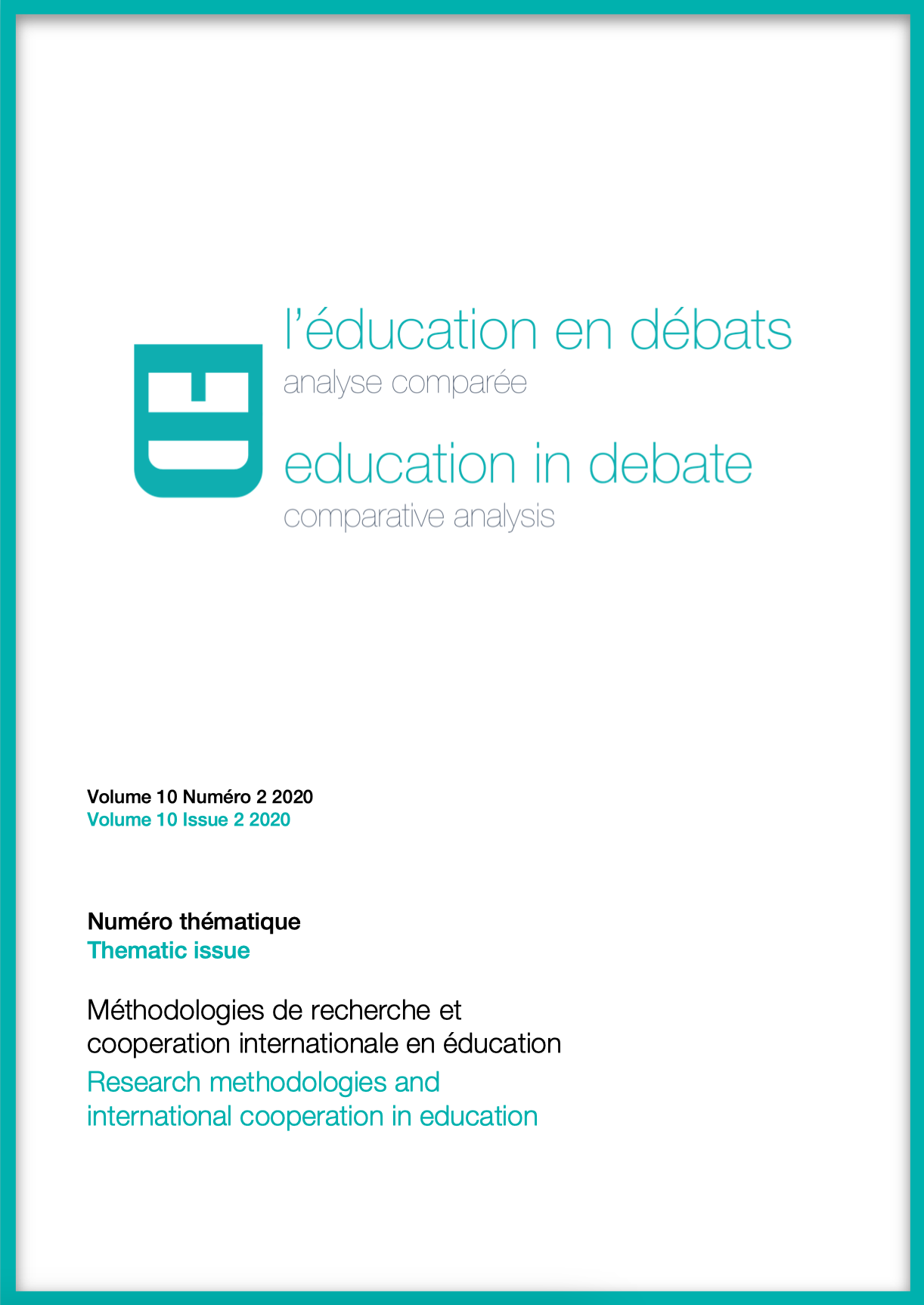La motivation autodéterminée des étudiant-es universitaires inscrits à un SPOC : quel type de régulation ? Cas de la Faculté des Sciences de Rabat
DOI:
https://doi.org/10.51186/journals/ed.2020.10-2.e344Keywords:
SPOC, online learning, university students, self-determined motivation, EMFAAbstract
This study is part of a research project on the impact of a SPOC on the motivation of Moroccan university students. It presents the case study of a SPOC on scientific terminology for students (N=792) enrolled in the first year (S1) at the Faculty of Sciences of Rabat (FSR). The course, which is part of the module “Language and Terminology”, was designed by a team of research teachers at the FSR and is delivered through the Mohamed V University’s Openedx platform (mooc.um5.ac.ma). The study aims to determine the impact of a SPOC on students’ self-determined motivation. At the theoretical level, motivation was approached from the point of view of Deci and Ryan’s Theory of Self-determination (SDT). The study employed a mixed-methods research design that combined the administration of a questionnaire based on the Adult Education Motivation Scale (EMFA) at the end of the SPOC with the analysis of student traces on the course platform. The statistical analysis revealed that the motivation of students taking a SPOC as part of the university curriculum is largely controlled by external demands relating to the teacher's decision and the reward of the grade obtained at the end of the course.
References
Bandura, A. (2003). Auto-efficacité. Le sentiment d’efficacité personnelle. Bruxelles : De Boeck.
Blumenfeld, P., Soloway, E., Marx, R. W., Krajcik, J. S., Guzdial, M., & Pilinscar, A. (1991). Motivating project-based learning: sustaining the doing, supporting the learning. Educational Psychologist, 26(3-4), 369-398.
Bryan, C. L., & Solmon, M. A. (2007). Self-determination in physical education: designing class environments to promote active lifestyles. Journal of teaching in physical education, 26, 260-278.
Carré, P. (2004). Bandura : Une psychologie pour le XXIème siècle ? Savoirs, hors-série(5), 9-50. https://doi.org/10.3917/savo.hs01.0009
Carré, P. (2005). L’apprenance : Vers un nouveau rapport au savoir. Paris : Dunod.
Connell, J. P. (1990). Context, self, and action: a motivational analysis of self-system processes across the life span. In D. Cicchetti, & M. Beeghly (Eds.), The self in transition: Infancy to childhood (pp. 61-97). Chicago: University of Chicago Press.
Conseil Supérieur de L’Éducation. (2018). L’Enseignement Supérieur Au Maroc : Efficacité, Efficience et Défis du Système. https://www.csefrs.ma/publications/lenseignement-superieur-au-maroc/?lang=fr
Deci, E. L., & Ryan, R. M. (1985). Intrinsic motivation and self-determination in human behaviour. New York: Plenum Press.
Deci, E. L., & Ryan, R. M. (2000). Self-determination theory and the facilitation of intrinsic motivation, social development, and well-being. American Psychologist, 55, 68-78.
Fenouillet, F. (2012). Les théories de la motivation. Paris : Dunod.
Fenouillet, F., Heutte J., & Vallerand R.-J. (2015, June 25-28). Validation of the adult education motivation scale. Fourth World Congress on Positive Psychology, Orlando, FL.
Heutte, J., Caron, P.-A., Fenouillet, F., & Vallerand R. J. (2016). Étude des liens entre les caractéristiques instrumentales et les différents types de motivations des participants dans un MOOC. Revue Internationale Des Technologies En Pédagogie Universitaire, 13(23), 94-110.
Fredricks, J. A., Blumenfeld, P. C., & Paris, A. H. (2004). School Engagement: Potential of the Concept, State of the Evidence. Review of Educational Research, 74(1), 59-109.
Karsenti, T. (1997). Comment le recours aux TIC en pédagogie universitaire peut favoriser la motivation des étudiants : le cas d’un cours médiatisé sur le web. Cahiers de la Recherche en Éducation, 4(3), 455-484.
Karsenti, T. (2013). Les MOOC : Révolution ou simple effet de mode ? Revue Internationale Des Technologies En Pédagogie Universitaire, 10(2), 6-37.
Karsenti, T. (2015). MOOC : La pédagogie universitaire face aux MOOC. Revue Internationale Des Technologies En Pédagogie Universitaire, 12(1), 1-12.
Karsenti, T., & Larose, F. (Eds.). (2001). Les TIC... au cœur des pédagogies universitaires : diversité des enjeux pédagogiques et administratifs. Québec, QC : PUQ.
Linnenbrink, E. A., & Pintrich, P. R. (2003). The role of self-efficacy beliefs in student engagement and learning in the classroom. Reading and Writing Quarterly: Overcoming Learning Difficulties, 19(2), 119-137.
Loisier, J. (2011). Les nouveaux outils d’apprentissage encouragent-ils réellement la performance et la réussite des étudiants en FAD ? https://archives.refad.ca/recherche/TIC/TIC_et_reussite_des_etudiants.pdf
Marchand, L. (2001). L’apprentissage en ligne au Canada : frein ou innovation pédagogique ? Revue Des Sciences De L’éducation, 27(2), 403-419.
Ministère de l’éducation nationale, de l’enseignement supérieur et de la recherche scientifique (2015). Rapport annuel 2015 des inspections générales. https://www.education.gouv.fr/Cid110456/Rapport-Annuel-2015-Des-Inspections-Generales.Html
Narcy Combes J.-P., & Narcy Combes M.-F. (2019). Cognition et personnalité dans l'apprentissage des langues : relier théories et pratiques. Paris : Didier.
Viau, R. (1994). La Motivation en contexte scolaire. St-Laurent, QC : Renouveau Pédagogique.
Viau, R., Joly, J., & Bédard, D. (2004). La motivation des étudiants en formation des maîtres à l’égard d’activités pédagogiques innovatrices. Revue Des Sciences de L'éducation, 301, 163-176.
Weinstein, C. E., & Mayer, R. E. (1986). The teaching of learning strategies. In M. C. Wittrock (Ed.), Handbook of research on teaching (pp. 315-327). New York, NY: Macmillan.
Downloads
Published
How to Cite
Issue
Section
License
Some rights reserved 2021 The Author(s)

This work is licensed under a Creative Commons Attribution 4.0 International License.




